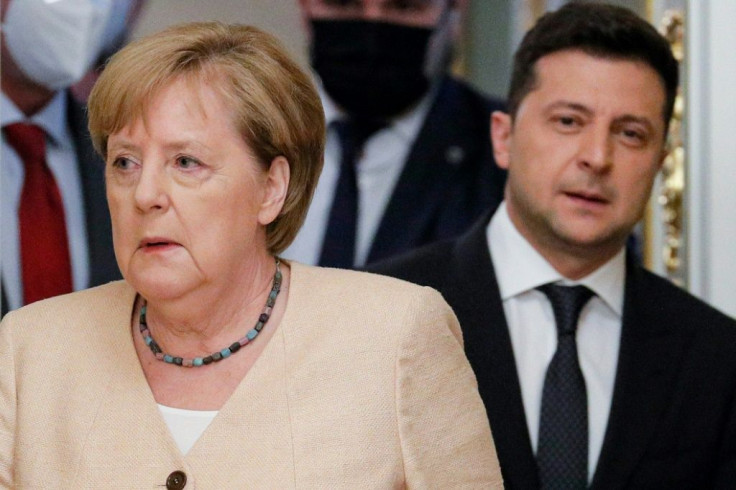Nord Stream 2 'Dangerous Geopolitical Weapon': Zelensky
Kiev sees the soon-to-be completed Nord Stream 2 pipeline carrying Russian gas to Europe and bypassing Ukraine as "a dangerous geopolitical weapon", President Volodymyr Zelensky said Sunday.
The Ukrainian leader was speaking at a joint press conference in Kiev with German Chancellor Angela Merkel, who has spearheaded the pipeline fiercely opposed by Russian neighbours Ukraine, Poland and the Baltic states.
The $12-billion pipeline beneath the Baltic Sea is set to double Russian natural gas shipments to Germany, Europe's largest economy. It avoids Ukraine, depriving Kiev of essential gas transit fees.
"We view this project exclusively through the prism of security and consider it a dangerous geopolitical weapon of the Kremlin," Zelensky said.
He added that the main risks after its completion will be "borne by Ukraine" but that the pipeline will also be dangerous "for all of Europe".
The pipeline "will only play into the hands of the Russian Federation," he said.
For her part, Merkel said Berlin agrees with Washington that "gas must not be used as a geopolitical weapon".
"It will come down to if there is an extension to the transit contract via Ukraine -- the sooner the better," she said, referring to the expiry of Moscow's agreement with Kiev in 2024.

The German leader, who met with Zelensky two days after visiting his Russian counterpart in Moscow, said she had discussed with Vladimir Putin extending the contract past 2024.
"We feel a special responsibility" and "understand the big concerns that President Zelensky expressed," she said.
"We take them very seriously."
Zelensky said he and Merkel had discussed the extension, but noted that he so far had heard only "very general things".
The construction of the pipeline led to tensions between Germany and the United States, but Washington eventually waived sanctions against the Russian-controlled builder of the pipeline.
Merkel said the Germany-US agreement specifies "sanctions" if gas is "used as a weapon".
She added that these commitments were "binding on future German governments", as she is set to leave office next month after 16 years in power.
Merkel has been a key ally of Ukraine since 2014, when Moscow annexed Crimea and pro-Russia separatists broke away from the country's east.
But the German chancellor has frustrated Ukrainian authorities by opposing sending arms to Kiev and pushing across the finish line the Nord Steam 2 pipeline.
© Copyright AFP 2024. All rights reserved.





















